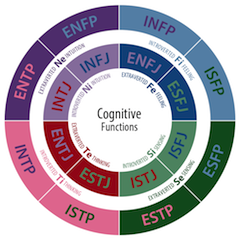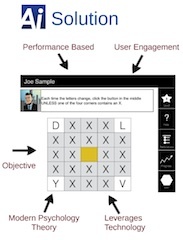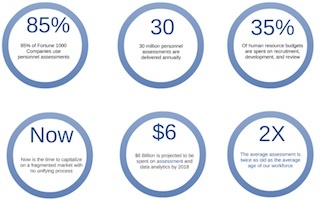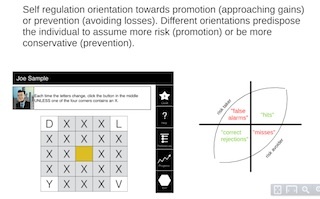Have you recently completed a pre-employment assessment? One of the typical Myers Briggs or DiSC tests where you were identified as an "extrovert" or "ISTJ" or "achiever?" If so, you are part of the 33 million people who endured workforce evaluations last year.
Annually, businesses spend over $4 billion on these workforce analytics -- and the industry is forecasted to hit $6 billion by 2018.
Interestingly enough, the major market players originally developed their assessments in the 1920s, and little has changed since -- despite drastic innovations and discoveries in psychology.
Cognitive psychology is like cancer research; every ten years, there's a major breakthrough -- especially in the 70s, with the huge cognitive revolution. When I talk to high-level HR executives, at big multinational corporations, they're relatively surprised by these scientific flaws. I get the standard, 'well we've been doing it forever.' Nobody gets fired for buying IBM. But I tell them, it's like going to a cardiologist, and the cardiologist saying to the patient, 'I'm going to examine your heart using a tool developed in 1920, I'm going to charge you a lot of money for it, there is a lot of research showing how old, antiquated and basically unreliable it is, and all of my MD-cardiologist peers tell me it doesn't work.' You'd walk out of the examination room and say, 'you're crazy!' And yet billions are spent on a test with no demonstrated return on investment.
I sat down with Kevin Greaney, the former CEO of Children's Progress, and founder of Assessment Innovation, to learn about the impacts and potential negatives such antiquated -- and seriously influential -- testing could have on both the employers and prospective employees. Long story short, old testing can prohibit talent discovery -- and Kevin's company, which evaluates cognitive analytics for organizations -- is here to save great minds from bad tests.
Steve Mariotti: Can you explain Assessment Innovation to me?
Kevin Greaney: Old testing to be subjective and one-dimensional. Assessment Innovation (Ai) develops multidimensional and iterative assessments of skills, abilities, and competencies to help drive business planning. These assessments are couched in engaging, game-like challenges that are presented on mobile devices where patterns of responses and response times are critical to gaining insight. Ai challenges go deeper than the typical assessments -- they examine performance in through simulations and tests of critical thinking, professional engagement and social interaction.
SM: How does your test work?
KG: Business as usual consists of something like this: You apply for a job online; you provide a little information about yourself; submit a resume and a cover letter; and that's it. Now, a hiring manager has to go through all these applications and make decision about whom to interview and whom to pass on. In the end all they have is a "gut feeling" or an intuition about who might be worthwhile to interview. My goal is to streamline this process and in a quick, scientifically based assessment that equally benefits the organization and the applicant--a cognitive interview that provides insights to the organization and the applicant.
SM: How are the answers given?
KG: Our assessment presents game-like challenges to the applicant that are engaging and reflect real-world expectations of the position (e.g., interacting with customers, working with team members on a project, industry-specific problem solving and critical thinking, etc.). And each challenge is multidimensional and examines a number of different concepts with every response. As a hiring manager, you get a wealth of information and predictive analytics that helps you to make the right decision.
SM: What is wrong with the old testing methods?
KG: The Myers Briggs and the DiSC assessments are older than the polio vaccine, the transistor radio, and color television. They require a trained professional not only to administer the assessment, but also to interpret the results. The preferred method of administration is paper-and-pencil. And, best of all, there is endless evidence that demonstrates that these assessments are invalid and unreliable (Gladwell.com).
SM: This is the entire industry?
KG: The entire industry, this is what's really interesting -- it's all based on self-reporting, which means it's a survey. So all these psychological tests are basically, "how would you, when you walk into a room... " You could be an extrovert at the office with your staff, in command, in control. Then you go home to your wife or your girlfriend, and be an introvert. And then you could go out to a bar with your friends and be an extrovert. And you can go see your mother or grandmother in her old age home and be an introvert, all in the same day. And it varies with how the social interaction is. It's not like, 'this is what you are, and you're this for life' and so forth. But the earlier tests, based on Jung and Freud, were static and saw you as only one type, not dependent on the context or situation. Now we know better, and that's what has driven my work. Now, with Assessment Innovation, we look for more than just the type, but for signs of critical thinking, decision making, motivation.
SM: Who is on your team?
KG: We have a small, nimble team right now. Luckily, we know a little something about finding talent. There's myself and my COO -- and we handle a lot of the business development. I have my CTO and a team of programmers who are developing the technology. And I have two lead psychologists who manage a network of leading researchers from top universities across the globe.
Special thanks to Maya Horgan and Lauren Bailey for helping craft this article.





